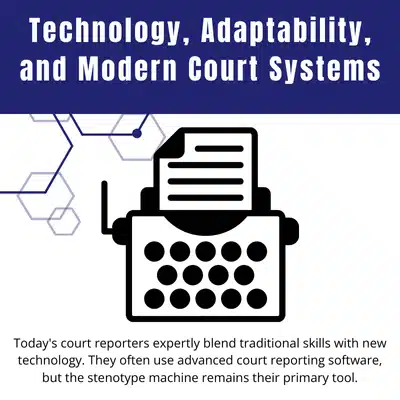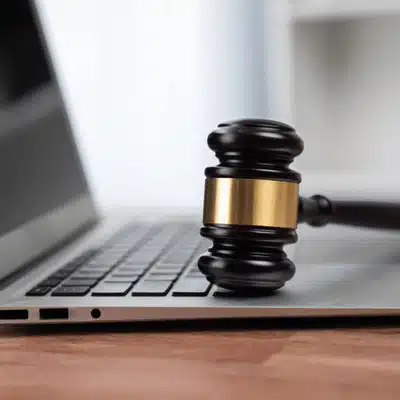
Court reporters may work quietly in the background, but their role is vital to every legal case. If you’ve ever asked “what does a court reporter do,” the short answer is this: they create a certified, word-for-word record of everything said during legal proceedings. These skilled professionals use their skills to create exact records of all court proceedings, producing written transcripts that become official legal documents. Their work environment requires focus, accuracy, and strong time management, since every word must be captured in real time. Their certification ensures they meet high professional standards and can handle the pressure of fast-paced trials.
So, what is a court reporter? A court reporter is a trained professional who records legal testimony and produces an official transcript that attorneys and courts can rely on. What is the role of the court reporter? Their job is to protect the record, so there’s no confusion later about what was actually said.
When you invest in quality court reporting, you gain a powerful ally. Expert court reporting ensures nothing gets lost or misheard, giving your case the solid foundation it needs to succeed, especially when careful proofreading guarantees transcripts are error-free and reliable.
If you’re also wondering what a court reporter does in a courtroom, they record testimony word-for-word and turn it into a certified transcript. A court reporter records every spoken word, identifies each speaker, and prepares a certified transcript for motions, trial prep, and appeals. If you’re also wondering what do court reporters do day to day, they preserve the facts exactly as they happened, so the case stays fair and defensible.

The main court reporter role in legal proceedings is capturing every spoken word with perfect accuracy during the court proceedings. Even in a busy courtroom environment, they use techniques like machine stenography to transcribe speech in real time with exceptional speed and precision.
This creates an impartial, word-for-word record that all parties can trust. The accuracy becomes crucial when cases move to appeal. Appellate courts rely entirely on these transcripts when reviewing trials. If something gets misstated or left out of the court record, it can change the outcome of an appeal.
Verbatim transcripts also help attorneys examine witness testimonies for contradictions. They can refer to exact quotes, which eliminates arguments over what was actually said. A reliable record preserves the facts and legal procedures of each case.
Court reporters also bring neutrality and professionalism to proceedings. They must maintain strict confidentiality and impartiality, which protects the integrity of every court record.
Court reporting extends far beyond the courtroom. So what does a court reporter do in a deposition? They capture sworn testimony word-for-word and produce a transcript attorneys can use to prepare, challenge inconsistencies, and protect the record. During pre-trial sessions, reporters transcribe deposition testimony verbatim. These transcripts become essential tools for trial preparation.
Attorneys study these records to understand each witness’s story and build their strategy. If a witness changes their account at trial, the deposition transcript can expose the contradiction. This often undermines the witness’s credibility.
By locking in sworn testimony, court reporters help attorneys avoid surprises and prepare effective cross-examinations.

Creating flawless transcripts requires exceptional skills and extensive training. Court reporters must master stenography or voice writing techniques to capture speech at high speeds. Many achieve typing speed over 225 words per minute.
They learn to use a stenotype machine that records keystroke combinations representing sounds. Others train in voice writing by speaking into specialized equipment. Reporters also develop excellent listening skills and master complex legal terminology.
Attention to detail is critical. A reporter cannot mishear a technical term or judge’s order. Their work continues after proceedings end. They handle careful proofreading, editing, and formatting of transcripts. They also index and catalog exhibits used during court sessions.
This behind-the-scenes effort produces clean, certified transcripts ready for use as official records. Effective time management is vital since reporters often juggle multiple tasks under tight deadlines.
Becoming a court reporter requires rigorous certification and often state licensing. Many states require reporters to pass exams and maintain their qualifications through continuing education. Professional associations like the National Court Reporters Association help set these standards and provide additional training.
Reporters must follow a strict code of ethics. They uphold confidentiality and impartiality at all times, protecting each case’s integrity.

Today’s court reporters expertly blend traditional skills with new technology. They often use advanced court reporting software, but the stenotype machine remains their primary tool. It instantly translates keystrokes into text, enabling real-time transcription and live captioning for remote participants.
In remote hearings and hybrid sessions, what does a court reporter do to keep the record clean? They track speakers, handle fast cross-talk, and make sure the final transcript is complete and usable.
Top reporters show great adaptability, whether working in busy courtrooms or virtual hearings. While some courts have tried audio recording devices or voice recognition technology, these tools often struggle with background noise or multiple speakers. An experienced reporter accurately captures every word regardless of conditions.
Court reporters also provide real-time captioning services for various settings. This includes television broadcasts and live events, making content accessible for deaf and hard-of-hearing audiences.
The job outlook for court reporting remains strong. Thousands of openings are projected each year as veteran reporters retire. Many states enforce strict licensing standards and require regular continuing education hours for license renewal.
Court reporters earn a respectable salary. The median annual income is about $67,000, with higher earnings in high-demand areas. These salary levels reflect the expertise required for the profession.
The field offers diverse career paths and varied work environment options. Many reporters work in state or federal court systems as official stenographers. Others freelance and cover arbitrations for law firms. Some specialize in captioning for broadcasts or live events.
If you’re still asking what does a court reporter do outside the courtroom, the answer often includes depositions, arbitrations, and legal proceedings that still require a certified record. All court reporters share the same commitment to delivering accurate, timely transcription services. Many participate in professional associations that offer networking and professional development opportunities. This helps them stay current and maintain their licensing requirements.

Modern court reporting balances human expertise with technological tools. While automated systems exist, they cannot match the accuracy and adaptability of skilled professionals. Court reporters understand context, recognize speakers, and handle complex legal situations that technology cannot manage alone.
What is the role of the court reporter as courts go more digital? It now includes managing secure files, supporting remote sessions, and keeping transcripts consistent with court requirements.
Their responsibilities now include managing digital files, providing remote services, and integrating with various court management systems. This requires ongoing continuing education to stay current with new tools and techniques.
Court reporting is a powerful asset that strengthens your legal case from start to finish. By producing exact records of court proceedings and witness testimonies, court reporters safeguard the facts. This enables fair trials and provides solid grounds for appeals through reliable legal documents.
The combination of human skill and technology-savvy reporting remains essential. Court reporters maintain this balance through ongoing continuing education and adaptability with new tools.
If you’re weighing your options and wondering what does a court reporter do that supports your case, it comes down to one thing: protecting the official record with accuracy you can rely on. If you need a certified transcript for a deposition, hearing, or trial, working with a licensed court reporter helps ensure the record is complete, clear, and court-ready.
A court reporter captures every spoken word during proceedings and produces a certified, verbatim transcript. If you’re searching what is a court reporter, this is the core of the job. That transcript preserves the record for motions, trial strategy, and appeals where accuracy is critical.
No—automated systems struggle with crosstalk, accents, legal terminology, and noisy rooms, and they can’t clarify or identify speakers. A certified reporter provides real-time accuracy, neutrality, and a defensible record the courts trust.
Realtime delivers on-screen text of testimony as it is spoken, allowing attorneys to flag issues, impeach quickly, and adjust strategy on the fly. It also provides accessibility for remote participants and those who are deaf or hard of hearing.
Seek state licensure where required, national certifications (e.g., RPR, RMR), and experience with your case type. Ask about turnaround times, proofreading and formatting standards, and secure handling of exhibits and digital files.
